 Leading Blog | Posts by Month |
 Leading Blog | Posts by Month |
02.29.24

Leading Thoughts for February 29, 2024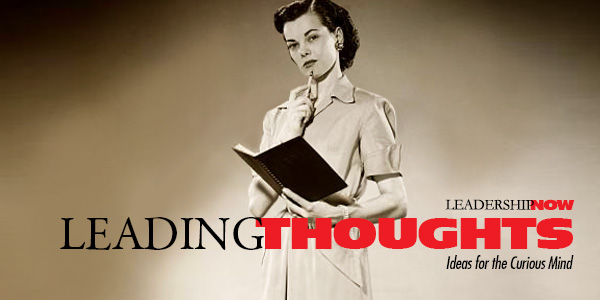
IDEAS shared have the power to expand perspectives, change thinking, and move lives. Here are two ideas for the curious mind to engage with: Kevin Roberts on the nature of leadership: “Where should people start with “leadership” in a VUCA world? Leadership is both art and science. There are all kinds of leadership. There is not a one-size-fits-all approach. But the essence of leadership doesn’t change. In the last 50 years, production, distribution, and communication have been reset by technology. Leadership hasn’t changed much in 5,000 years. Technology doesn’t alter leadership. It lets leaders reach more people, quicker, more emotionally—that’s all. Leadership resists change because it’s about human nature. Leaders take people to a better place.” Source: 64 Shots: Leadership in a Crazy World Douglas Rushkoff on swallowing the storyteller’s pill to experience relief: “If a storyteller wants us to believe in a religion, then his god will be responsible for our relief. If he wants us to believe in a politician or product, then one of these will be the solution.” Source: Get Back in the Box: Innovation from the Inside Out Look for these ideas every Thursday on the Leading Blog. Find more ideas on the LeadingThoughts index.
Posted by Michael McKinney at 03:41 PM

LeadershipNow 140: February 2024 Compilation
See more on
Posted by Michael McKinney at 08:05 AM
02.26.24

Elon Musk by Walter Isaascson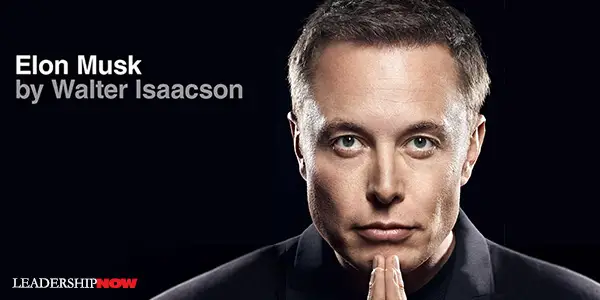
LOVE HIM or hate him, Elon Musk is not easily dismissed. While there is genius in his high-tech visions, some of his opinions and antics leave some people disturbed if for no other reason than they don’t align with their own. Walter Isaacson’s biography of Elon Musk is full of revealing, behind-the-scenes anecdotes that provide insight into why Musk does what he does and why he does it that way. Even though Musk’s approach doesn’t necessarily provide a blueprint to be copied any more than Steve Jobs’ approach did (even though both individuals got results), it does offer lessons to be learned and applied in our own leadership. Musk remarked on Saturday Night Live in May of 2021, “To anyone I’ve offended, I just want to say, I reinvented electric cars and I’m sending people to Mars in a rocket ship. Did you think I was also going to be a chill normal dude?” Below, you will find some excerpts that give you a taste of what you will find in Isaacson’s Elon Musk. Growing up: Isaacson concludes with this observation of Musk: One can admire a person’s good traits and decry the bad ones. But it’s also important to understand how the strands are woven together, sometimes tightly. It can be hard to remove the dark ones without unraveling the whole cloth. As Shakespeare teaches us, all heroes have flaws, some tragic, some conquered, and those we cast as villains can be complex. Even the best people, he wrote, are “molded out of faults.” 
Posted by Michael McKinney at 01:30 PM
02.23.24

Empathy: The Top Leadership Skill for Today’s Work Environment
AS workplace cultures evolve, we must specifically prioritize the needs of each human being. An empathetic approach to organizational culture has been proven to have positive business outcomes. Recently, a large study ranked empathy as the most important leadership skill in the workplace. Empathy has been shown to drive positive business results and has numerous therapeutic effects on stressed employees. When leaders expressed empathy for their team, it increased a team’s innovation and engagement, improved customer service, and helped them balance their home and work life. British entrepreneur Sir Richard Branson said, “Understanding empathy, as well as the experiences of people from different areas of life, is a key skill for business leaders.” With similar conviction, Satya Nadella, CEO of Microsoft, said, “Empathy makes you a better innovator. ...It’s a quality my wife helped me begin to learn when our son was born with severe disabilities. It’s a quality that shapes our quest to meet unmet needs of customers. And…it helps us as a society move forward in creating new opportunities for all.” To further document empathy’s advantages at work, the Global Empathy Index, published in the Harvard Business Review, examined data from employee’s responses to questions ranging from a CEO’s approval ranking to their own happiness level in their job. Researchers found that empathic companies are the most profitable and are associated with increased employee earnings and gratification as well as customer satisfaction. The appeal of empathic leadership extends beyond conventional office environments. Former Navy SEAL commander Mark Divine trains athletes, SWAT teams, first responders, and aspiring SEALS to combine mental toughness with intuition and heart. Empathic leadership is not only for supersensitive types. It is also for tough people in any field. You can become an empathic leader whether you’re a new manager, a C-suite executive, or you’re simply leading by example in any job even if you don’t manage anyone. Because the need for empathy and human connection has increased in our chaotic world, the power of everyday empathic leadership has grown. To become a more empathetic leader, hone these key traits:
When an empathic leader, for example, sees a team member faltering, they don’t crank up the pressure to perform or use criticism to motivate. Nor do they lead with impatience, which only makes people freeze or panic. Instead, they begin with appreciation for the person’s contributions to the team. Then, in a caring tone, they address any difficulties they are encountering and explore strategies together to reach their goal. Approaching a team member with empathy rather than provocation doesn’t make leaders pushovers, weak, or unable to set boundaries. Rather, they incorporate strength and compassion to lead.  Sign up here for Dr. Orloff’s online webinar about empathetic healing techniques based on The Genius of Empathy on April 20, 2024, 11am-1pm PST. 
Posted by Michael McKinney at 08:41 AM
02.22.24

Leading Thoughts for February 22, 2024
IDEAS shared have the power to expand perspectives, change thinking, and move lives. Here are two ideas for the curious mind to engage with: Christina Maslach and Michael P. Leiter on the source of burnout: “We believe burnout is the result of a mismatch between employee and workplace. Burnout is best conceptualized as a relationship problem—an issue with the fit, or match, between the person and the job. When there is a good match, the worker is likely to be engaged with the job and happy, energetic, confident, and ready to commit to a productive long-term relationship. But when there is a mismatch, the employee is more likely unhappy, exhausted, and cynical. A person in this situation may be unwilling to do more than the bare minimum, and ready to quit the relationship and leave for another job. In short, a worker experiencing a major mismatch is likely to experience burnout.” Source: The Burnout Challenge: Managing People’s Relationships with Their Jobs Professor Moshik Temkin asks if you would fight back against a fascist power? “We should not ascribe everything that happened in Vichy France to ideology or anti-Semitism. Probably a much more important reason for why certain French citizens acted the way they did was one of the strongest human desires—the desire for normality, which often just equates to conformity. The ideal scenario in 1940, at least for those who were able to, was to abide by the new status quo in an effort to keep life as normal as possible. Source: Warriors, Rebels, and Saints: The Art of Leadership from Machiavelli to Malcolm X Look for these ideas every Thursday on the Leading Blog. Find more ideas on the LeadingThoughts index.
Posted by Michael McKinney at 08:28 AM
02.19.24

Steve Jobs: The Dynamics of An Excellent Team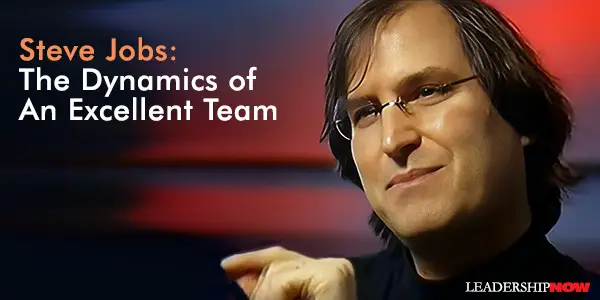
IN this interview, Jobs explains the dynamics of a team that pushes to excel—to be above average—excellent. There are some team leaders who would argue that a great team is all smiles and agreement. But that only produces stasis or marginal improvement at best. It’s groupthink. A productive team that pulls the best thinking from all members encourages the friction we need to grow into something transformative. What follows is a lightly edited portion of Steve Jobs: The Lost Interview, released in 2012, explaining what is required from a team to achieve excellence. One of the things that really hurt Apple was after I left, John Sculley got a very serious disease, and that disease I’ve seen other people get it, too. It’s the disease of thinking that a really great idea is 90% of the work and that if you just tell all these other people, “Here is this great idea,” then, of course, they can go off and make it happen.
Posted by Michael McKinney at 09:17 AM
02.16.24

quickpoint: What Middle Managers Do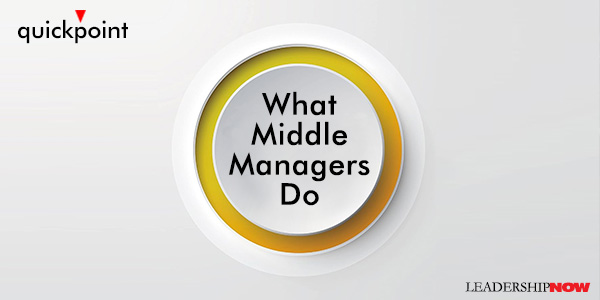
IN Power to the Middle: Why Managers Hold the Keys to the Future of Work, authors Bill Schaninger, Bryan Hancock, and Emily Field contend that middle managers are crucial to the new world of work. What middle managers do is actually much more complex than what either executives or frontline workers do: They manage both up and down, and serve as translators in both directions. What kind of qualities and skills does the job require? Emotional intelligence, resilience, adaptability, technical skills, critical thinking, communication skills, being open to change, seeing the big picture, and managing both full-time and contract/gig workers. Everything they do deeply affects the work, the workforce, and the workplace. Consequently, Senior leaders should make transforming the role of middle managers their top priority. They should invest in their success, placing their most qualified and valued people in these roles, providing training for them to excel, rewarding them within the role rather than promoting them into more senior positions, and most importantly giving them the time to actually manage. By trusting managers to make decisions, and sending a clear message that these roles are highly desirable, middle managers will be better positioned to make an impact. 
Posted by Michael McKinney at 09:38 AM
02.15.24

Leading Thoughts for February 15, 2024
IDEAS shared have the power to expand perspectives, change thinking, and move lives. Here are two ideas for the curious mind to engage with: Talia Fox on listening: “Many of us remain confident in our ability to listen, insisting that we’ve been doing so all our lives. We believe we should focus our leadership efforts on other, less common skills, gravitating to things that seem newer and more innovative. Source: The Power of Conscious Connection: 4 Habits to Transform How You Live and Lead Chris Deaver and Ian Clawson on leading with questions: “If you want to focus on improving relationships, lead with a question. Instead of “How are you doing?” try asking, “What’s something exciting You‘re working on?” or “What do you recommend we do?” Watch people smile and light up when they feel connected. Next time you see someone is struggling, ask, “What’s on your mind?” This could make the difference in their day. It could free up their emotional constraints, even if just for a moment.” Source: Brave Together: Lead by Design, Spark Creativity, and Shape the Future with the Power of Co-Creation Look for these ideas every Thursday on the Leading Blog. Find more ideas on the LeadingThoughts index.
Posted by Michael McKinney at 02:24 PM
02.12.24

5 Leadership Lessons: The Pursuit of Excellence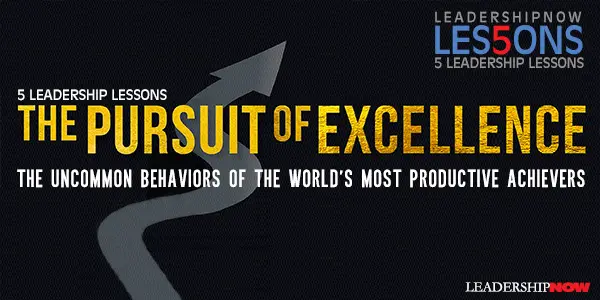
RYAN HAWK has interviewed hundreds of leaders on his podcast The Learning Leader Show. He has collected their wisdom in The Pursuit of Excellence: The Uncommon Behaviors of the World’s Most Productive Achievers. It is filled with practical thoughts and behaviors that will make you think and potentially set you on a path to sustained growth. Here are just five ideas he shares from those on his podcast:

Posted by Michael McKinney at 10:05 AM
02.09.24

Evolve or Dissolve: Shaping Your Corporate Culture for a Remote Reality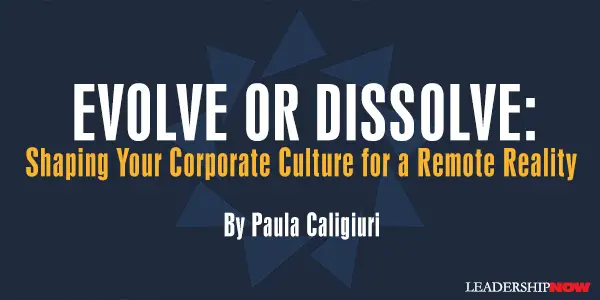
IN THE PAST DECADE, the corporate world has seen a seismic shift in how it operates. The advent of technology that enables remote work combined with the ever-increasing rate of employee turnover in many industries has led to a transformation in the very fabric of organizational culture. Businesses striving to adapt and thrive amidst these changes must find innovative solutions to the matter of maintaining a robust corporate culture. The Erosion of Traditional Corporate Culture A strong corporate culture will influence how team members interact and conduct business. Teams operating within a strong culture share a set of values, beliefs, and behaviors. These are learned over time and socialized when newcomers “learn the ropes” from interactions with and observation of colleagues and leaders. But today’s decentralized office environment makes it harder to socialize culture, foster a sense of unity, and reinforce shared values. Additionally, greater turnover rates disrupt continuity and the transmission of cultural values, leading to a disjointed and often weakened corporate identity. Importantly, if corporate culture is left unattended, over time it will weaken and dissolve. Remote Work: A Double-Edged Sword While remote work offers flexibility and can increase productivity, it limits opportunities for spontaneous collaboration and social interaction — both crucial for building a cohesive culture. Without the organic conversations that occur in physical office spaces, employees can feel isolated and new hires may struggle to assimilate into the company’s ethos.In attempting to bridge this gap, Google, for example, has invested in virtual reality technology to create more immersive and interactive remote meetings. Using a very different approach, companies like Yahoo and IBM, once pioneers in remote work, reconsidered their remote work policies and brought team members back into the office to preserve their corporate culture. The Impact of High Turnover Frequent employee turnover further complicates the picture. Each departure is a loss of cultural knowledge, and each new hire is a potential cultural reset. This constant flux can make it more challenging to maintain a stable and consistent corporate culture. If companies experience increases in short tenure among senior associates, they will have fewer leaders able to transmit the corporate culture. Some industries, such as professional services, hospitality, and retail, are experiencing higher turnover rates, impacting the maintenance of strong corporate cultures. 5 Strategies to Strengthen a Weakening Corporate Culture In response to these challenges, companies must be proactive in nurturing and evolving their corporate cultures. Here are five strategies to consider:
The evolving landscape of work presents unique challenges to maintaining a strong corporate culture. However, with thoughtful strategies and tools like myGiide, companies can adapt and even thrive in this new era. By focusing on communication, connection, adaptation, socialization, and recognition, organizations can forge a resilient and dynamic culture that withstands the tests of distance and turnover.  
Posted by Michael McKinney at 10:38 AM
02.08.24

Leading Thoughts for February 8, 2024
IDEAS shared have the power to expand perspectives, change thinking, and move lives. Here are two ideas for the curious mind to engage with: Scott Shigeoka on other-directed curiosity: “If we don’t direct our curiosity toward what’s outside of us, we can—become insular and overly self-focused. This can breed narcissistic or egotistical behaviors, decaying our ability to be sensitive and empathetic to the wants and needs of others. When we spend time and energy directing our curiosity outward, we reduce the risk of clinging on to a more individualistic mindset (such as the self-help trope that your only priority is for you to show up fully rather than to also consider how others are feeling). When we practice outward curiosity, we adopt a more collective and harmonic mindset that recognizes the inherent truth that we are all interconnected—to each other and to the planet.” Source: Seek: How Curiosity Can Transform Your Life and Change the World Entrepreneur Liz Elting on fine is not fine: “This experience reinforced to me the importance of one-on-ones and taught me that as we grew, we needed to institute skip-level meetings so that our employees knew they were welcome to speak with their boss’s boss. These are also crucial because it can be difficult for an employee to open up about issues with the manager when speaking to that manager. When not allowed the opportunity to skip a level, the employee is more likely to say everything is fine. Fine is not fine. Fine is a deceptively bad term because it’s not definitive. Fine is what we say when we’d rather say something else but aren’t comfortable – it’s not worth it to do so. Fine doesn’t help anyone grow or improve. I’d much prefer an employee have a higher-level outlet who’s empowered to help them, rather than leaving them to their own devices, which may include bad-mouthing their boss to their coworkers and bringing down morale.” Source: Dream Big and Win: Translating Passion into Purpose and Creating a Billion-Dollar Business Look for these ideas every Thursday on the Leading Blog. Find more ideas on the LeadingThoughts index.
Posted by Michael McKinney at 11:43 AM
02.05.24

Mind Shift: It Doesn’t Take a Genius to Think Like One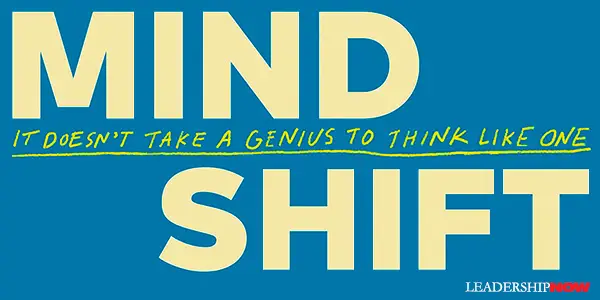
THE REASON for writing Mind Shift is to destroy our internal limitations. Erwin Raphael McManus begins by reflecting on a statement he once heard, “Some people are simply structured for failure.” Based on our thoughts, we are structured or wired to behave within certain frequencies. If we think in toxic ways, we will get toxic outcomes. It takes a mind shift to move from where we are to where we want to be. “If my mind can be structured for failure, then it can also be structured for success.” It’s a choice. Most of us not only avoid near-death experiences, we avoid near-life experiences as well. We almost risk for love. We almost pursue our dreams. We almost overcome our fears. We almost live the life we long: for. We almost make the decision that would have changed everything. And then we get to the end of our lives and realize that we were so close. We were always just one choice away. “Every time you want to elevate your level of execution, performance, or effectiveness, it will require a mind shift.” McManus offers twelve mind shifts we can address to create the mental architecture for success. Mind Shift #1: It’s All About People Life is not about things. The quickest way to regret is to place things and experiences over relationships. “If we don’t know what really matters, we will spend our lives accumulating the very things that do not matter—discarding the things that matter most.” We can become so focused on our goals that “the people in our life may quickly go out of focus.” Mind Shift #2: You Don’t Need an Audience You don’t need an audience to reveal your greatness. “Greatness is always grown in private. You don’t need an audience to prepare for the biggest moments of your life. Commit to greatness when you have no audience. Discipline yourself and prepare yourself to be the best at what you do. Live as if today you may be given the greatest opportunity of your life. Be ready to step up when the call comes.” Mind Shift #3: You Can’t Take Everyone with You Not everyone shares your vision and is prepared to carry it forward. Two key leadership ideas: Leaders create clarity, raise standards, and call people to more. By definition, this creates a dividing line. Great leaders are not afraid to define what it means to be on their team, organization, or movement. They know their vision isn’t for everyone, and they recognize those with a shared vision. Great leaders also know that great teams form when there is a sifting process. Mind Shift #4: They Won’t Get It Until You Do It You are the proof of the legitimacy of your vision. Get on with it. “If You are playing it safe, you are playing to lose. The full measure of your gifts, and talents, and potential, and life, cannot be actualized if you are not willing to step into risk. You must choose between acceptance and uniqueness. If you’re addicted to affirmation, you will become a reflection of yourself rather than the genuine version of you.” Mind Shift #5: You Are Your Own Ceiling You can blame others or take responsibility for your life. When your brain is telling you that some external factor is holding you back, you give up your power to change your circumstances. “The questions we should be asking ourselves are: Where is it my responsibility? Where did I fail? What could I have done differently? You don’t want to internalize failure, but you absolutely want to internalize responsibility. Where does your thinking need to change?” Mind Shift #6: Talent Is a Hallucinogen We bet on talent, overlook character, and underestimate grit. Mind Shift #7: No One Knows What They Are Doing Starting is more important than knowing. You learn as you go. “When you are living with the delusion that you know everything needed in order to succeed, you have a huge blind spot, and you are less likely to learn the skills and knowledge that are crucial for your success. When you know you don’t know, you are perfectly postured for learning.” Mind Shift #8: Bitterness, and Other Poisons That Will Kill You McManus says that one of the hardest people to help is a bitter person. “When someone is discouraged, you can call out their strengths and tell them all the ways you admire them. When someone is grieving, you can love them and be present in their grief. But when someone is bitter, they are rarely open to the process required to find healing.” Bitterness is a choice, and it hardens your heart. “The reality is that when you are bitter, you are no longer in your own story.” Optimism is a choice—a discipline. “We must choose positive emotions, while negative emotions seem to choose us. It takes discipline to see the good when things are going bad. It takes discipline to see beauty in the midst of tragedy. It takes discipline to see the best in people when they let us down.” Mind Shift #9: You Find What You Are Everything has a frequency and if you get stuck in the wrong frequency you will attract the wrong people into your life. “The best assessment of who you are is not who you say you are, but who you are convinced others are. Here is the mind shift: You will find in the world what you bring to the world.” Love has a frequency. Hope has a frequency. Faith has a frequency. Courage has a frequency. Integrity has frequency. Compassion has a frequency. Generosity has a frequency. When you choose to live in these frequencies, you are drawn to those who are like-minded, and they are drawn to you. Mind Shift #10 Be Average (At Almost Everything) We are not good at everything. Learn to say no. “The average in my life is not who l am. It is who l am not. Be good at something, but with the same level of intention, choose to be average at a lot of things.” Mind Shift #11: Success Weighs More Than Failure Success doesn’t make you a better person; it just amplifies what you already are. Success has a price tag. “While money, fame, and the trappings of success can be extraordinary outcomes of a life well lived, they make for terrible objectives. Your life purpose must be bigger than simply becoming famous, rich, or powerful. If these are the fuel of your life, you will always be running on empty. You will achieve everything you’ve ever wanted and still feel as if you have nothing. You must live for more. There is no level of success that will give meaning to your life. If you do not already have meaning in your life, all that you attain in life will have no meaning.” Mind Shift #12: There Is No Such Thing as Too Much of a Good Thing Make room for things that make you better. “Be ruthless in eliminating everything that is not a reflection of your best self.” Be extravagant with hope. “You cannot break a person who refuses to give up on hope. Hope is the magic behind optimism.” You can’t be too forgiving. “The idea that I should be forgiven without limits is incredibly appealing to me. The idea that I should forgive others without limit is not as palatable. Relationships will only last as long as the forgiveness flows.”
Posted by Michael McKinney at 02:35 PM
02.01.24

Leading Thoughts for February 1, 2024
IDEAS shared have the power to expand perspectives, change thinking, and move lives. Here are two ideas for the curious mind to engage with: Matthew Syed on giving failure a makeover: “Self-justification is insidious. Lying to oneself destroys the very possibility of learning. When a plane has crashed, it’s difficult to pretend the system worked just fine. The failure is too stark, too dramatic. Most failure is not like that. Most failure can be given a makeover. You latch on to any number of justifications: ‘it was a one-off,’ ‘it was a unique case,’ ‘we did everything we could.’” Source: Black Box Thinking: Why Most People Never Learn from Their Mistakes—But Some Do Sam Walker on finding leaders: “I started to suspect that the real reason we can’t agree on the formula for elite team leadership is that we’ve overcomplicated things. We’ve been so busy scanning the horizon for transformational knights in shining armor that we’ve ignored the likelier truth: there are hundreds upon thousands of potentially transformative leaders right in our midst. We just lack the ability to recognize them.” Source: The Captain Class: The Hidden Force That Creates the World's Greatest Teams Look for these ideas every Thursday on the Leading Blog. Find more ideas on the LeadingThoughts index.
Posted by Michael McKinney at 02:22 PM

First Look: Leadership Books for February 2024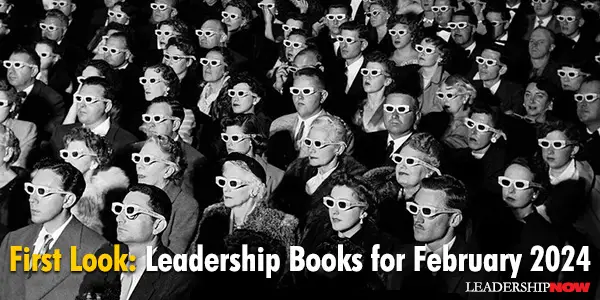
HERE'S A LOOK at some of the best leadership books to be released in February 2024 curated just for you. Be sure to check out the other great titles being offered this month.
Learn how to perform at your very best, from the psychologist who has advised elite military operators, Olympic medalists, big wave surfers, neurosurgeons, cliff divers, first responders, Cirque du Soleil acrobats, professional athletes and coaches, Fortune 500 business executives, and CIA analysts. Learned Excellence is a comprehensive and practical guide to the mental disciplines of high performance, from the expert who developed the US Navy SEALs mental toughness curriculum and has worked with thousands of top athletes, elite military personnel, business executives, and first responders. These stars perform across a wide variety of fields, but they all have something in common: when they are at work they know how to think clearly, stay focused, and shrug off setbacks under very high levels of stress.
The always-on, hustle culture creates an unhealthy, counterproductive relationship with work. Many workers believe that to compete with other top talent, they must embrace a culture that rewards long hours and a constant connection to work. Businesses and society endorse busyness, overwork, and extreme commitment as the most valued traits in workers. Sometimes that endorsement is explicit, as when Elon Musk told X/Twitter employees to work "long hours at high intensity" or get fired. More often it's an implicit contract, a buildup of organizational and cultural norms and the adoption of new technologies that make it easy to tether people to work. Either way, this workaholic behavior is unhealthy and counterproductive for workers and for organizations. It's time to fight back.
Today's headlines teem with employee unrest over racial injustice, communities infuriated by corporate environmental impacts, staff anxiety over surveillance, public outrage over corruption in business, and discoveries of child labor in supply chains. We've traveled far and fast from the old world of business ethics, where black-and-white concerns about bribery and fraud could be addressed via rules and processes. Simply maximizing shareholder value while not breaking the law is no longer a tenable approach, but we've never been so confused about what it means to do the right thing—and why it's so important.
Come inside a jury room as one juror leads a starkly divided room to consensus. Join a young CIA officer as he recruits a reluctant foreign agent. And sit with an accomplished surgeon as he tries, and fails, to convince yet another cancer patient to opt for the less risky course of treatment. In Supercommunicators, Charles Duhigg blends deep research and his trademark storytelling skills to show how we can all learn to identify and leverage the hidden layers that lurk beneath every conversation. Communication is a superpower and the best communicators understand that whenever we speak, we’re actually participating in one of three conversations: practical (What’s this really about?), emotional (How do we feel?), and social (Who are we?). If you don’t know what kind of conversation you’re having, you’re unlikely to connect.
Virtually every problem can be traced back to one root cause: leadership. Far too many leaders are struggling, merely maintaining the status quo and unable to find the way forward. What these leaders need is a fresh take on how to unlock their full potential. Uncommon Greatness is the key many leaders have been searching for their entire career. This book will reframe much of what you know about traditional leadership theory and practice, challenge some of your deeply held assumptions, and provide scores of practical and concrete ideas you can use today. Former Vice President of High Performance Leadership at Chick-fil-A, Inc., Mark Miller believes it’s possible for all leaders to lead at a higher level and increase their impact on the world.
Follow the incredible career journey of Lisa Lutoff-Perlo, from her stories as an ambitious young woman to President and CEO of Celebrity Cruises to Vice Chairman for External Affairs at Royal Caribbean Group. A shining testament to the value of being an authentic leader and never sacrificing your integrity, Lutoff-Perlo details the ins and outs of her extraordinary 40-year career. Along the way, she ultimately transformed and redefined relaxed luxury cruising with the launch of the bold, innovative Edge Series ships in 2018, which drove unprecedented demand for Celebrity Cruises and propelled the brand’s financial performance. She climbed the corporate ladder from the very bottom and overcame countless obstacles to reach the top of the cruise industry.
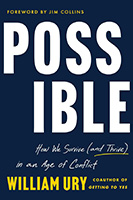  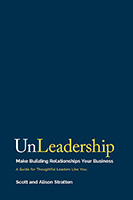 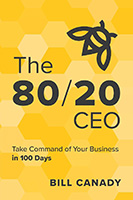
“... a mind needs books as a sword needs a whetstone, if it is to keep its edge.” — George R.R. Martin, A Game of Thrones
Posted by Michael McKinney at 11:13 AM
|
BUILD YOUR KNOWLEDGE


How to Do Your Start-Up Right STRAIGHT TALK FOR START-UPS 
Grow Your Leadership Skills NEW AND UPCOMING LEADERSHIP BOOKS 
Leadership Minute BITE-SIZE CONCEPTS YOU CAN CHEW ON 
Classic Leadership Books BOOKS TO READ BEFORE YOU LEAD |
|